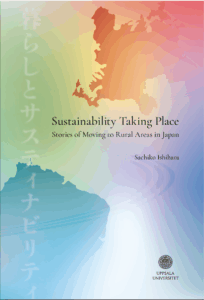Welcome to CEMUS course coordinator alumni Sachiko Ishihara’s defence of the doctoral thesis “Sustainability Taking Place: Stories of Moving to Rural Areas in Japan”
The defense will likely take 2-3 hours. Following a lunch break, the (hopefully positive) assessment result will be announced at the kitchen of the Department of Human Geography on the 4th floor of Ekonomikum, alongside some light refreshments, which everyone is welcome to. No need to register for this.
External reviewer: Charlotta Hedberg Supervisors: Sofia Cele, Erik Jönsson Research subject: Social and Economic Geography, Department of Human Geography, Uppsala University
When: September 19 at 10.15
Where: Sal X, University Main Building, Biskopsgatan 3, Uppsala
Online: Register to receive a Zoom link: https://doit.medfarm.uu.se/bin/kurt3/kurt/8890439
Abstract
 Despite the dominant trend of migrating to cities, significant numbers of people move to rural areas to pursue different lifestyles. This thesis examines why people moved to two remote islands, Yakushima in Kagoshima Prefecture and Gotō in Nagasaki Prefecture, located in southwestern Japan, and how they experience their new lives. Utilizing in-depth interviews and participant observation, these migration stories are analyzed as lived sustainabilities, discussing the role of place in their ideas and practices. Shifting away from quantitative and global targets, these stories explore what sustainability means personally and how individuals enact it.
Despite the dominant trend of migrating to cities, significant numbers of people move to rural areas to pursue different lifestyles. This thesis examines why people moved to two remote islands, Yakushima in Kagoshima Prefecture and Gotō in Nagasaki Prefecture, located in southwestern Japan, and how they experience their new lives. Utilizing in-depth interviews and participant observation, these migration stories are analyzed as lived sustainabilities, discussing the role of place in their ideas and practices. Shifting away from quantitative and global targets, these stories explore what sustainability means personally and how individuals enact it.
While global sustainability challenges are often difficult to grasp due to their causes and effects spanning large scales of time and place, this inquiry shows how people make sense of these questions at the scale of their everyday lives. Escaping the social acceleration and anonymity of urban life, they were drawn to Japanese rural idylls, seeking personal sustainability by slowing down and changing their ways of work to feel valued as individuals. Rather than passive and static backdrops or bounded entities, place and time emerge here as relational and dynamic—the urban and rural are interlinked, and the slow and fast lives are entangled. Attuning to temporalities bound with nonhuman beings in these places, the rural is re-discovered and re-valued with an intriguing mix of nostalgia for the past and possibilities for a “sustainable” future.
Not primarily motivated by financial gain, these stories gestured towards post-growth imaginaries. What emerged were narratives that differed from the restrictions and footprints that are commonly associated with sustainability, instead describing pursuits for more meaningful lives: having control over one’s time, finding joy in simple daily acts, and realizing and caring for the interdependent web of relations that humans are a part of. Based on ethnographic writing and poetic inquiry, this study describes Sustainability taking place, inviting readers to reflect on their multifaceted and embedded roles as individuals and to engage in a conversation that dwells on the pleasures to be gained through practicing sustainability.
Read more and download doctoral thesis: Sustainability Taking Place: Stories of Moving to Rural Areas in Japan
